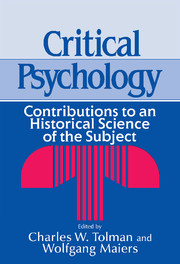Book contents
- Frontmatter
- Contents
- Preface
- Acknowledgments
- Contributors
- Critical Psychology
- 1 Critical Psychology: An Overview
- 2 Critical Psychology: Historical Background and Task
- 3 Societal and Individual Life Processes
- 4 Experience of Self and Scientific Objectivity
- 5 Psychoanalysis and Marxist Psychology
- 6 Emotion, Cognition, and Action Potence
- 7 Action Potence, Education, and Psychotherapy
- 8 Personality: Self-Actualization in Social Vacuums?
- 9 The Concept of Attitude
- 10 Client Interests and Possibilities in Psychotherapy
- 11 Play and Ontogenesis
- 12 Functions of the Private Sphere in Social Movements
- Bibliography
- Index
9 - The Concept of Attitude
Published online by Cambridge University Press: 21 March 2010
- Frontmatter
- Contents
- Preface
- Acknowledgments
- Contributors
- Critical Psychology
- 1 Critical Psychology: An Overview
- 2 Critical Psychology: Historical Background and Task
- 3 Societal and Individual Life Processes
- 4 Experience of Self and Scientific Objectivity
- 5 Psychoanalysis and Marxist Psychology
- 6 Emotion, Cognition, and Action Potence
- 7 Action Potence, Education, and Psychotherapy
- 8 Personality: Self-Actualization in Social Vacuums?
- 9 The Concept of Attitude
- 10 Client Interests and Possibilities in Psychotherapy
- 11 Play and Ontogenesis
- 12 Functions of the Private Sphere in Social Movements
- Bibliography
- Index
Summary
As explained elsewhere in this volume, Critical Psychology demands a fundamental critique and revision of psychology's basic concepts and, to that end, employs an historical reconstruction of the development and differentiation of the psychic as a means of investigating the formation of basic concepts. The new method of concept formation made possible by this historical approach begins with an analysis of already existing concepts to determine their precise object reference, their limitations, and their mystifications, so that their potential scientific value and status in the conceptual system of general psychology can be established. The operational version of this Critical Psychological principle of the unity of critique and further development is called reinterpretation. The classic example is Ute Holzkamp-Osterkamp's (1976) reinterpretation of Freudian concepts in the development of her “conflict model.”
The critical result of reinterpretation should not be that already existing concepts (what Holzkamp has called preconcepts) continue to exist eclectically, side by side with the newly developed concepts, regardless of their incompatible theoretical and methodological origins, but that the epistemological value of the old concepts is preserved and becomes incorporated into the new ones through an appropriate transformation. Determining the value of existing concepts can be done either by an analysis of the historical development of the object itself or by a reconstruction of the history and development of the concept within the discipline. The latter form of analysis is usually secondary; that is, it is used as a preliminary or follow-up to the first.
- Type
- Chapter
- Information
- Critical PsychologyContributions to an Historical Science of the Subject, pp. 180 - 195Publisher: Cambridge University PressPrint publication year: 1991
- 1
- Cited by



